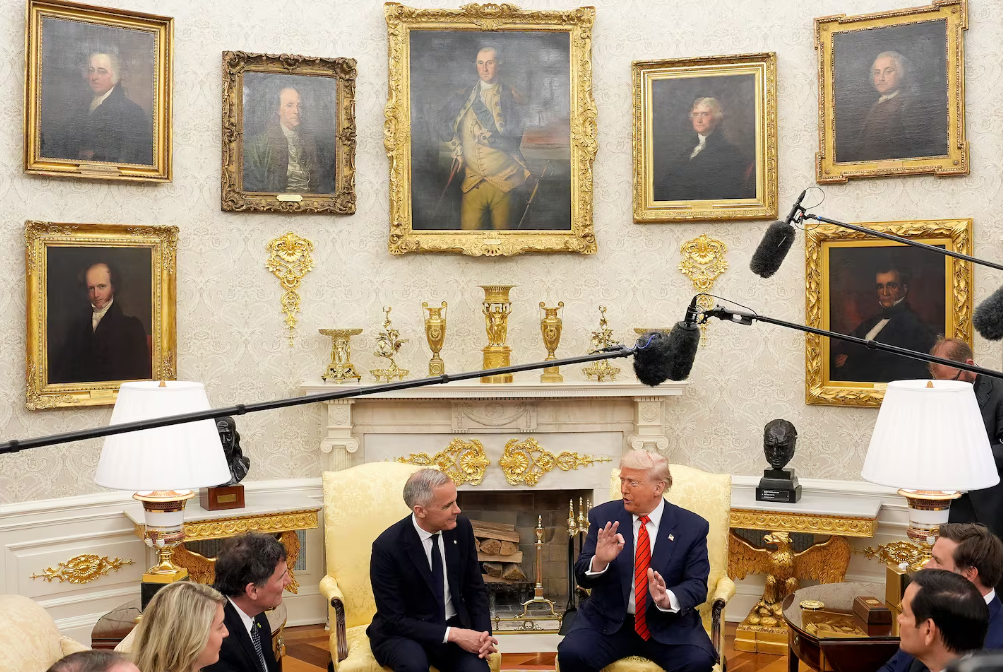您想继续阅读英文文章还
是切换到中文?
是切换到中文?

THINK ALUMINIUM THINK AL CIRCLE

Canadian Prime Minister Mark Carney is heading to Washington next week for a crucial meeting with US President Donald Trump. This marks Carney's second visit to the White House since taking office, and expectations are high for progress on long-standing issues, particularly steel and aluminium tariffs.

The meeting, described as a "working visit," will take place on Tuesday, with Carney accompanied by key ministers, including Foreign Affairs Minister Anita Anand, Industry Minister Melanie Joly, and Canada-U.S. Trade Minister Dominic LeBlanc.
Get your hands on - American Aluminium Industry: The Path Forward
The primary focus of the visit will be strengthening the economic and security relationship between Canada and the US, with both nations working to resolve trade disputes, especially over tariffs. Tensions have been mounting due to Trump's tariffs on Canadian goods, including a new 10 per cent levy on softwood lumber imports and a 25 per cent tariff on cabinets and furniture, effective October 14. While the Canadian team remains cautiously optimistic about reaching an agreement, the path forward is uncertain, especially with Trump's unpredictable negotiating style.
The tariffs on steel and aluminium have been a major point of contention.
Earlier this year, the US increased tariffs on these imports to 50 per cent, prompting Canada to respond with a 25 per cent counter-tariff on US goods. Despite weeks of preparation by Canadian officials, including LeBlanc, Ambassador Kirsten Hillman, and Clerk of the Privy Council Michael Sabia, the outcome of next week's meeting is still uncertain. As one source put it, "You never know what Trump is going to do."
LeBlanc has stressed that while the talks are ongoing, Canada remains hopeful. He pointed out that Trump's administration is heavily influenced by private investments, a factor that may help shape future discussions. However, he also acknowledged that Canada-US relations may not return to the state they were in a year or even 25 years ago.
In addition to the ongoing tariff disputes, the two countries are working on a broader economic and security deal. Carney, who promised during his campaign to stand up to Trump, has prioritised securing the "best deal" over rushing a quick resolution. He pointed out that Canada's trade relationship with the US remains strong, with 85 per cent of exports still tariff-free. In a bid to de-escalate tensions, Canada recently dropped many of its counter-tariffs, particularly those on goods covered by the CUSMA trade agreement.
Also Read: Trump aluminium tariffs shake the industry — how are SMEs surviving the storm?
Despite these efforts, Carney has faced criticism, particularly from Conservative Leader Pierre Poilievre, who has blasted the prime minister for not securing a deal by his self-imposed July 21 deadline. Poilievre took to "X" to accuse Carney of backing down repeatedly without any tangible results. Carney, for his part, has maintained regular contact with Trump, including through text messages, though not all details of their conversations have been shared publicly.
The upcoming meeting is especially significant following Carney's last trip to Washington in May, where both leaders disagreed on Trump's suggestion that Canada become the 51st state. Remarkably, Trump revived this idea earlier this week, signalling that, while the discussions may be productive, there's still much room for disagreement. The world will be watching as Carney and Trump meet once again to negotiate their countries' future trade relations.
Image Source: Adrian Wyld/The Canadian Press
Responses








